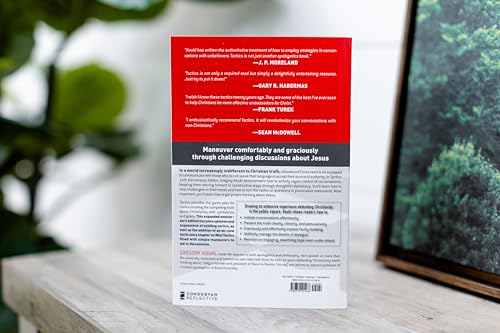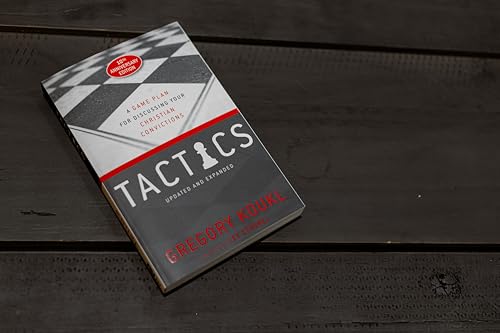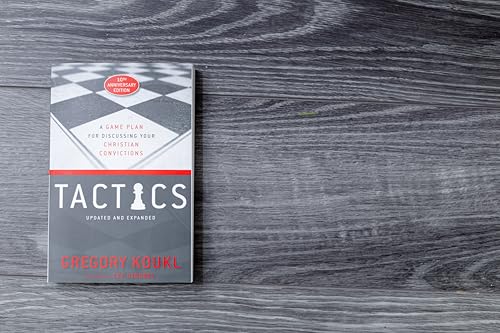Customer Services
Copyright © 2025 Desertcart Holdings Limited













Tactics, 10th Anniversary Edition: A Game Plan for Discussing Your Christian Convictions [Koukl, Gregory, Lee Strobel] on desertcart.com. *FREE* shipping on qualifying offers. Tactics, 10th Anniversary Edition: A Game Plan for Discussing Your Christian Convictions Review: Excellent and Incredibly Helpful — Full of Practical Wisdom - Tactics, 10th Anniversary Edition: A Game Plan for Discussing Your Christian Convictions is an excellent book and extremely helpful. It’s packed with thoughtful insights and practical “gems” that equip believers to engage in meaningful conversations about their faith with clarity and confidence. What makes this book stand out is how approachable and usable it is. The tactics are easy to understand, respectful in tone, and genuinely effective in real conversations—not just theoretical arguments. I would highly recommend this to anyone who wants to better articulate and defend their Christian convictions while remaining gracious and thoughtful in discussion. Review: A Must-Read for Every Christian - This book is a must for every believer seeking to strengthen their faith and confidently share it with others. It powerfully reinforces the core beliefs of Christianity and provides a solid foundation for explaining them to those who question or are curious. One of the greatest challenges in presenting the gospel is not knowing how to explain why we believe what we believe. This book confronts that very issue. It challenges us to examine our faith through the lens of reason, evidence, and trustworthiness. By doing so, it not only deepens our personal convictions but also equips us to engage in meaningful conversations about the hope we have in Christ. Clear, insightful, and deeply rooted in truth, this book is an excellent tool for anyone who wants to grow in faith and be a more effective witness. Highly recommended.





















| Best Sellers Rank | #2,597 in Books ( See Top 100 in Books ) #2 in Evangelism #9 in Christian Apologetics (Books) #102 in Christian Spiritual Growth (Books) |
| Customer Reviews | 4.8 4.8 out of 5 stars (6,295) |
| Dimensions | 5.25 x 0.6 x 8.06 inches |
| Edition | Anniversary |
| ISBN-10 | 0310101468 |
| ISBN-13 | 978-0310101468 |
| Item Weight | 2.31 pounds |
| Language | English |
| Print length | 288 pages |
| Publication date | November 26, 2019 |
| Publisher | Zondervan |
C**Y
Excellent and Incredibly Helpful — Full of Practical Wisdom
Tactics, 10th Anniversary Edition: A Game Plan for Discussing Your Christian Convictions is an excellent book and extremely helpful. It’s packed with thoughtful insights and practical “gems” that equip believers to engage in meaningful conversations about their faith with clarity and confidence. What makes this book stand out is how approachable and usable it is. The tactics are easy to understand, respectful in tone, and genuinely effective in real conversations—not just theoretical arguments. I would highly recommend this to anyone who wants to better articulate and defend their Christian convictions while remaining gracious and thoughtful in discussion.
D**A
A Must-Read for Every Christian
This book is a must for every believer seeking to strengthen their faith and confidently share it with others. It powerfully reinforces the core beliefs of Christianity and provides a solid foundation for explaining them to those who question or are curious. One of the greatest challenges in presenting the gospel is not knowing how to explain why we believe what we believe. This book confronts that very issue. It challenges us to examine our faith through the lens of reason, evidence, and trustworthiness. By doing so, it not only deepens our personal convictions but also equips us to engage in meaningful conversations about the hope we have in Christ. Clear, insightful, and deeply rooted in truth, this book is an excellent tool for anyone who wants to grow in faith and be a more effective witness. Highly recommended.
D**T
This is the all-important second-side of apologetics
Apologetics requires two sides of a person - the knowledgeable reasoning side and the compassionate, calm-but-tactical side. Both are key, whether you are a presuppositional apologist or an evidentiary apologist. Regardless of the facts you put on the forefront of your apologetic, this book helps make your conversations more fruitful, last longer, and reach more people for Christ. This book is a supreme source to help develop this second side. Greg Koukl is an apologetics professor at Biola University and has his own radio talk show where he defends the Christian worldview. He also conducts an online ministry at str dot org. (STR = stand to reason) The focus of this book is to provide easy-to-remember and usable tactics for discussing your faith and conversing with people of different viewpoints in ways to open their minds to the Christian worldview. Koukl begins with a discussion on the need to keep discussions from being trench warfare. Too many discussions about Christian apologetics are cut short by harsh arguments that do little. Christians must be all things to all people and find a way to share the faith while not scaring off those we want to have hear it. In short, Koukl writes "If anyone in the conversation gets angry, you lose." Greg's underlying principle is not to take everyone to the cross with every discussion. Some people are way too far away from belief to make such a trek in such a small amount of time. The need to help open the other person's mind to Christ and plow the field to make the ground of the heart fertile is most necessary in many people. That is why he focuses on putting a rock in everyone's shoe. What he means by this is he wants to put an idea in their head that they will likely spend a lot of time thinking about. He wants to be the rock in the shoe that noone forgets about. Through this, he plants a seed of thought in the person and leaves the rest up to God. While the intent of this book is not to give ready-made answers to specific arguments critics have, there are specific examples he discusses while he is giving examples of how a tactic might work. For example, the belief in moral relativism is discussed when he discusses the tactic of "Practical Suicide" (an argument that cannot stand because it is self-refuting.) The reviews of this book included inside the cover are a who's-who of Christian apologists. And, after reading the book, I see what they were all raving about. This book is one of the top apologetic resources I have read, and it serves as a practical guide for all discussions. I give this book my highest recommendation for anyone interested in Christian apologetics regardless of your experience or knowledge level. This book will be suc a huge blessing to all Christians and to their ability to discuss Christ more effectively.
H**R
Excellent book full of great information. It's a must read!
This is a fantastic book to help you share your beliefs. It is full of practical tips for having difficult but important conversations and doing so effectively. The focus is not on winning an argument but rather on sharing your faith effectively and helping others see things differently. It is a great book, and I would highly recommend it.
K**E
This book is great for not only Christian apologetics, but for day to day conversations in general. For perspective, I would imagine that an extremely staunch Athiest, Agnostic, Muslim, Buddhist and many others would still enjoy this book. The book itself is very easy to follow and gets quick to the point. It's far to common that you pick up a book to enjoy, only for it to be the equivalent of reading through sludge, trying to decipher the extraordinarily pompous and unnecessary words jotted on the pages, assumingly just for the sake of superficially elevating itself above others, without fine tuning the sentences themselves. The Author gives real world examples for each individual tactic to give a better understanding on how to apply said tactics. Word choice is excellent, you can tell that the Author put a lot of thought in to writing this book. The sentences are sophisticated enough for Intellectuals to enjoy, but simple enough for the average Joe to understand. I just can't express how enjoyable this book was to read. I personally don't fancy reading the same book a second time, but I just might make an exception for this book. The only downside I can find with this book is that it has been published by Zondervan, whose parent company is HarperCollins, who published the Satanic Bible and the Joy of Gay Sex. Completely vile and distusting. I suggest to find a used version or get a free pdf if possible. I personally wouldn't have ordered it if I knew it was published by Zondervan. On top of that, you are still supporting Amazon, the monopoly giant that squashes it's competition with low prices, or buys them out right. Pros: Fairly short read (200 pages) Straight to the point Effective tactics and arguments Useful outside of apologetics Cons: You support HarperCollins and Amazon
A**Y
My wife really enjoyed this book
J**A
It's a good book, written especially for those who feel intimidated or insecure to share their faith in Christ to others. Gokul covers lots of very powerful communication tactics which would help to engage in conversation, asking questions, putting the burden on the other side to prove their viewpoints. He teaches us how we can be in a driver seat and maneuver the conversation to the direction we want. I enjoyed reading it. I'm reading it again. Thanks to the author for writing this book.
M**I
Es ist ein sehr gutes Buch. Ich denke jede Christ soll es Lesen. Dieses Buch gibt uns rede Wendungen und Taktik wie wir mit die Leute um uns herum umgehen sollen.
L**A
Um dos melhores livros existentes sobre apologética cristã. Espero que seja traduzido brevemente, para que outros no país possam desfrutar dessa leitura extremamente necessária, para quem quer entrar em debates sobre religião e cultura de maneira elegante e eficaz para o reino de Deus.
Trustpilot
2 weeks ago
2 months ago